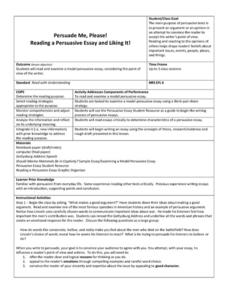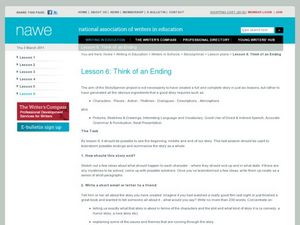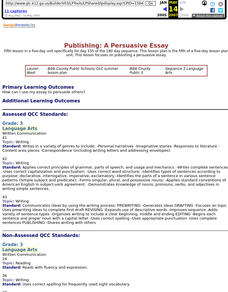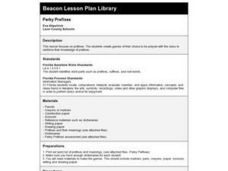Curated OER
Sequential Curriculum for Advanced Writing Workshop
Twelfth graders engage in a ten-month long elective course focusing on college board review and an advanced writing workshop. Both course components focus on thinking and reasoning skills. Various approaches include sentence combining,...
Curated OER
Eye No the Write Won!
Second graders practice with synonyms, antonyms, and homophones. After listening to a Berenstain Bears story, 2nd graders utilize worksheets imbedded in this plan to gain practice identifying these parts of speech. A nice lesson!
Curated OER
Persuade Me, Please! Reading a Persuasive Essay and Liking It!
Persuade your writers that crafting arguments is not that difficult. They only need to follow the steps outlined in this resource.
Curated OER
Blogging to Create a Community of Writers
One of the keys for successful teaching is connecting curriculum to real-life experiences. This lesson on blogging does this, by making writing, revising, and publishing a reality. Pupils create a character for a story, write about their...
Curated OER
Think of an Ending
Good endings are hard to find. And write. This, the final lesson in a six-part series devoted to study of the ingredients of a good story, focuses on crafting endings. Class members draft ideas about what should happen to each of their...
Curated OER
Can you write?
In this ESL worksheet, students complete a crossword puzzle using action verbs. Illustrations are included for six clues needed to complete the puzzle.
Curated OER
All's Well That Ends Well
Students examine and discuss the parts of a speech and how to organize them. They read sample speeches, then write a short presentation to read to the class, identifying the beginning, middle, and ending of their speech.
Curated OER
"My Animal"
Students determine which animal best represents them write reasons why. This is a nice culminating lesson for students who have been working on descriptive writing.
Roy Rosenzweig Center for History and New Media
Differences Among Colonial Regions
Classes look at and analyze primary source images to explore the differences between the colonial regions during the Revolutionary era. They break into groups to tackle each region and then present their findings to the class. A final...
Curated OER
Parts of Speech: Nouns
Second graders discuss nouns. In this language arts instructional activity, 2nd graders discuss nouns and pronouns. Students identify various types of nouns on a worksheet. Students play "Popcorn" Nouns.
Curated OER
Topic: Persuasive Speech
Students write and present health related persuasive essays. For this persuasive essay lesson, students write a two minute long speech about how to stay fit, which they rehearse a home. They present the speech in a second class period.
Curated OER
Giving a Persuasive Speech
Students examine how to plan their own thoughts, write down specific notes, and prepare to give their speech on a topic from the list. They take a specific side and present their arguments to the class.
Curated OER
Informative Speech with Research
Students complete an informative research activity. In this informative speech lesson, students select a topic to research and write an informative speech for the topic. Students rehearse and give their speech in class.
Curated OER
Free Speech Comes At a Price
Young scholars use communicative activity strategy, Go, Ask and Tell, or more traditional whole text comprehension activity to read, discuss and explore issues in article, Free Speech Comes at a Price, by Hugh Mackay.
Curated OER
Designing Visual Support For "The Greatest American" Speech
Students study several periods in American history, define the term "greatest American," and brainstorm possible criteria for selecting great Americans. They create a three to five minute persuasive speech along with visual aids to...
Curated OER
Verb Tenses; Reported Speech-3
For this foreign language worksheet, young scholars fill in the blanks for ten sentences. Each sentence present a quote that a person might hear. They write an interpretation of the intent of the speaker.
Curated OER
Keynote Digital Parts of Speech
Pupils create a parts of speech digital presentation. In this parts of speech instructional activity, students create a slide show with audio, pictures, movies, and text. They combine their slides to project the entire project.
Curated OER
Publishing: A Persuasive Essay
Third graders are given an opportunity to create a visual to accompany their presentations of their persuasive essays. They may use the computer or other media as resources.
Curated OER
Putting it Together: Analyzing and Producing Persuasive Text
Young orators demonstrate what they have learned about persuasion and persuasive devices throughout the unit by analyzing a persuasive speech and then crafting their persuasive essays. Class members engage in a role-play exercise, use...
Curated OER
Langston Hughes Was a Dreamer Too
Encourage your pupils to imagine their own dreams for the future. After studying three poems by Langston Hughes and listening to Dr. Martin Luther King, Jr.’s I Have a Dream speech, young poets craft their own dream stanza.
Curated OER
You Can Say That Again!
A discussion of the Supreme Court’s Opinion of Tinker v. Des Moines generates a discussion of the Bill of Rights and the First Amendment. Although the key elements of this lesson are based on a video that is not included, the activities...
Curated OER
Challenging Stereotypes: A New Look at Old Age
Combine a lesson on the elderly with grammar instruction. Before viewing a series of provided video clips, class members brainstorm a list of words related to senior citizens and organize these words into categories that correspond with...
Curated OER
Perky Prefixes
First graders create games of their choice to be played with the class to reinforce their knowledge of prefixes. This six-day lesson plan includes an excellent worksheet and assessment. I like the use of educational games!
Curated OER
Irony in "The Gift of the Magi"
Use O. Henry's ubiquitous tale of love and poverty to explore irony. After reading the story, middle schoolers identify examples of all three kinds of irony in the story. With partners, they brainstorm original examples of irony. Then...























